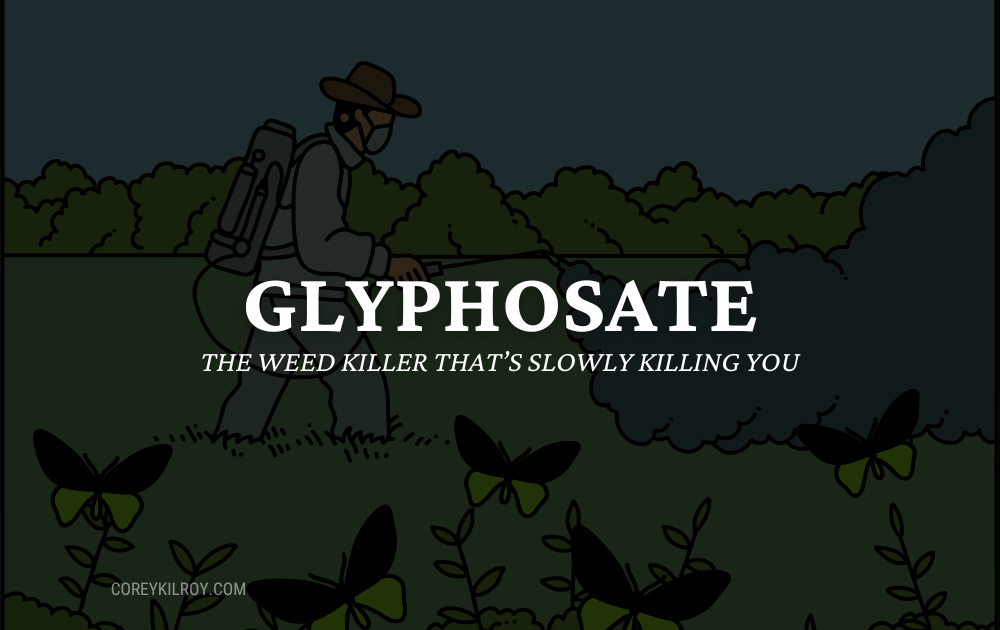What is Glyphosate & Why It’s Bad For You

We all know pesticides and weed killers are bad for you.
But why?
I’ve recently discovered that one of the major culprits includes glyphosate, and you may have heard of it.
What is Glyphosate?
Glyphosate is the active ingredient in weed killer products, like RoundUp™ and was discovered by chemist John E. Franz in 1970 and introduced to the market in 1974.
These herbicide products are some of the most widely used weed killers worldwide in farms, home gardens, and lawns.
Interestingly enough, glyphosate was originally patented as an antibiotic in 2010, long after its introduction as a herbicide.
This antibiotic was highlighted for its ability to inhibit the growth of certain bacteria and parasites. However, its use as an antibiotic is limited compared to its role in agriculture.
These two sides of glyphosate raise concerns about its impact on the human microbiome, which ultimately plays a crucial role in our overall health.
Where is Glyphosate Found?
Agriculture
Glyphosate is predominantly used in agriculture.
Farmers spray it on crops such as corn and soybeans that are genetically engineered to withstand glyphosate - aka genetically modified organisms (GMOs).
They also spray it on non-GMO crops such as wheat, barley, oats, and beans, to dry out the crops so they can harvest them sooner.

Food Products
Glyphosate also gets into foods early in the food chain, before raw food is harvested, and before it’s processed.
Studies have found glyphosate levels in a variety of foods, including:
-Fruits and nuts (fruit juice, pears, blackberries, limes, raisins, and walnuts)
-Honey
-Grains (breakfast cereals, wheat snacks, bread, wheat seeds, rye, oat, barley)
-Vegetables, like yams, potatoes, peas, and dried lentils
-Meat and fish
💡 Did you Know?
Glyphosate is found in beer
Since barley is the most common grain used in the beer making process, and studies have detected glyphosate in barley, it’s not surprising that the herbicide has also been found in beer.
One study of 100 samples of beer found glyphosate residue in 92 of the samples.
Not a giant sample size, but something to think about…
Glyphosate is found in oats
In a National Institute of Standards and Technology study of 13 oat-based food samples, the organization detected glyphosate in all of them. However, the levels detected were well below the EPA’s tolerance levels.
The study revealed the lowest levels of glyphosate in the organic oat breakfast cereal sample and organic oat flour sample. The highest levels were found in the traditional instant oatmeal samples.
So be careful what kind of oats you’re consuming.
Health Risks Associated with Glyphosate
Cancer Risk: The International Agency for Research on Cancer (IARC), part of the World Health Organization (WHO), classified glyphosate as "probably carcinogenic to humans" in 2015.
This classification was based on limited evidence of cancer in humans (from real-world exposures) and sufficient evidence of cancer in experimental animals (from studies of pure glyphosate).
Additional research has both supported and debunked this classification, ultimately leading to an ongoing debate and many lawsuits.
Gut Health Risk: As an antibiotic, glyphosate can affect the human microbiome.
Remember, the microbiome is a complex community of microorganisms living in our intestines that play a key role in digestion, immune function, and overall health.
Disruption of the microbiome balance can lead to:
-Gastrointestinal issues
-Weakened immunity
Increased susceptibility to chronic diseases
Endocrine Disruption: Glyphosate has been shown to disrupt endocrine function.
Remember, the endocrine system regulates hormones, which controls many vital processes in the body, including metabolism, reproductive health, and growth.
Disruption of this system can lead to a variety of health issues, including:
Developmental problems
-Metabolic disorders
-Infertility
Environmental Impact: Glyphosate also provides a negative impact to the environment.
It can contaminate soil and water, inadvertently impacting plants and wildlife.
The decline of pollinators, like our precious bees, has partly been attributed to glyphosate use, which ultimately threatens biodiversity and the health of our ecosystems.
How to reduce Glyphosate exposure?
1. Cleaning Foods
Washing fruits and vegetables can help reduce pesticide residues, including glyphosate.
Using solutions like baking soda or vinegar has been shown to be more effective than water alone. To clean your produce try either of these methods:
a. Baking Soda Solution: Mix 1 teaspoon of baking soda with 2 cups of water. Soak the produce for 12-15 minutes, then rinse with water.
b. Vinegar Solution: Mix 1 part vinegar with 4 parts water. Soak the produce for 15-20 minutes, then rinse thoroughly with water.
2. Natural Detoxification
The body has natural mechanisms to detoxify harmful substances, and supporting these processes can help fight glyphosate exposure.
a. Exercise: Yet another reason physical activity is so important. Exercise increases circulation in the body and supports the lymphatic system, ultimately helping to remove toxins from the body.
b. Hydration: Drinking plenty of water helps to flush out toxins through your urine. Another reason why drinking fluids when you’re sick is so important.
c. Infrared Sauna: Sweating helps to eliminate toxins through the skin. Infrared saunas penetrate deeper into tissues of the body, promoting a more effective detoxification.
d. Binders: Natural binders like activated charcoal, chlorella, and fulvic/humic acid can help bind and remove toxins from the digestive tract.
3. Choose Organic foods
Lucky for us, Glyphosate is banned in organic farming, so eating organic foods can reduce your exposure to glyphosate.
One study even found that adults and children who started to eat only organic foods had 70% lower levels of glyphosate after 6 days.
Of note, Glyphosate can still make its way into organically produced foods, but not nearly in the amounts as conventionally grown foods.
Prioritizing organic products, especially the produce found in the Clean Fifteen, can reduce your exposure.
I go over the best and worse foods for pesticide use in this year’s Dirty Dozen & Clean Fifteen lists here
In the end…
While yes, glyphosate has been a valuable tool for agricultural advancement, its potential risks, including cancer, microbiome imbalance, endocrine disruption, outweigh the benefits in my opinion.
To help reduce exposure and being proactive through food cleaning, choosing organic products, and supporting the body's natural detoxification processes, we can better protect our health and well-being.
Be well and Keep Pluggin.
-C.



